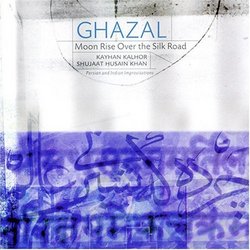| All Artists: Ghazal Title: Moon Rise Over Silk Road Members Wishing: 1 Total Copies: 0 Label: Shanachie Original Release Date: 2/22/2000 Release Date: 2/22/2000 Album Type: Import Genres: International Music, Pop Styles: Middle East, Iran, Islamic, India & Pakistan, India Number of Discs: 1 SwapaCD Credits: 1 UPCs: 016351662422, 669910072158 |
Search - Ghazal :: Moon Rise Over Silk Road
 | Ghazal Moon Rise Over Silk Road Genres: International Music, Pop
This is the third collaboration between Kayhan Kalhor, the Iranian kamancheh (a vertical, four-string fiddle) player, and Shujaat Husain Khan, a sitar virtuoso. Kalhor in particular has made great inroads in Europe and Ame... more » |
Larger Image |
CD DetailsSynopsis
Amazon.com This is the third collaboration between Kayhan Kalhor, the Iranian kamancheh (a vertical, four-string fiddle) player, and Shujaat Husain Khan, a sitar virtuoso. Kalhor in particular has made great inroads in Europe and America, bringing the music of Iran to listeners who would never have known about it, in no small part because of Ghazal. The idea behind this duo's work is to bring together two rather disparate classical traditions, Persian and Hindustani. The results are mixed. The casual listener will find this music interesting and approachable. Those who appreciate complex improvisation will find the talents of these two artists irresistible. Those who are well versed in either Persian or Indian music, however, may find that the improvisations wander a bit too much, having solid roots in neither tradition. Many may find Kalhor's solo recording, Scattering Stars Like Dust, to be far more satisfying. --Louis Gibson Similar CDs
Similarly Requested CDs
|
CD ReviewsBuilding on previous recordings.... jovaldo | 03/28/2000 (4 out of 5 stars) "Ghazal's third album "Moon Rise Over the Silk Road" is an extremely strong recording that has some extremely bright spots and memorable moments. Swapan Chaudhuri's explosive entrance into "Fire In My Heart" is unforgettable and shows why he is one of the world's most sought-after tabla players. Sitarist Shujaat Khan and kemencheh player Kayhan Kalhor continue to tighten up their "great experiment" (by that I mean the fusing of two distinct musical traditions.) They pull it off 99% of the time and have created an emotional, passionate, and beautiful album. At times it seems a little rushed or forced perhaps, but this album is superior to virtually every fusion record on the market. I still prefer Ghazal's "As Night Falls on the Silk Road" album, it is tight and never meanders. That's not to say that this isn't a fine recording though and worthwhile of your hard-earned cash. The short instrumental "Pari Mahal" sees the group expanding its parameters a little bit by bringing in some auxillary percussion and its quite a nice addition. Also the group brings in additional help on "Besh'no az Nay." Chaudhuri is replaced by the young tabla titan Sandeep Das who's playing can be likened to a machine-gun in concert! Also present on this track is Kayhor's longtime accompanist Pejman Hadadi, who is an incredible tombak player. I know I've spent a lot of time talking about the accompanists, but its because they play a major role on this recording. Kalhor's kemencheh is just as beautiful (and capable of evoking tears of both joy and sadness) as it ever was, and Khan's lilting sitar is still capable of lulling the listener into a better mood. The music is accessible, but not trite (a good combination.) Like the Amazon.com reviewer, I also highly recommend Kalhor's solo album "Scattering Stars Like Dust," and many of Shujaat Khan's solo albums are worth looking into as well (especially the one with 6 tracks that's self-titled and released on India Archive Music.) Overall this is a highly enjoyable record, and if you enjoyed their first two this one will provide more great hours of listening. While I don't think its quite as strong as the previous release, Khan & Kalhor must be praised for not sitting on their laurels, but by expanding their already potent and full sound." Not as good as the first two and repetitious jovaldo | 06/10/2000 (3 out of 5 stars) "I found the third CD of Ghazal to be repetitious, as though they had said everything they had to say in the first two albums. Undoubtedly the musicianship is excellent but in terms of compositions and creativity, it was much less exciting and very "deja vu". Too bad! I had expected such wonderful musicians to expand beyond and not to just adhere to a formula that had worked before." Passion, Energy, Fire Erika Borsos | Gulf Coast of FL, USA | 07/31/2002 (4 out of 5 stars) "The first track basically sets the tone of the whole CD:
fast improvisations between sitar and kamancheh, with the tabla rhythmically following their pace ... like a conversation between two long lost friends/lovers who meet after 20 - 25 years have passed: there are emotional highs, lows, and everything in between. It is exactly like two passionate, emotional people talking. I give the artists credit for stretching into new venues ... just because the listener can't always follow, doesn't mean it isn't good: just try interrupting two people who have an emotional bond and lots of history together, you can't get a word in edgewise & if you try, they'd shut you up because you're just not tuned in, not on their plane. Ghazal demonstrates integrity in redefining improvisation by melding two cultures: Indian and Persia. This is a very fine CD. However, like the previous reviewers: I dropped one star *only* because I expected one solid meditative, mysterious melody that I could call blissful. There is nothing wrong with passion, fire and energy but I *would* appreciate *MORE* relaxation, meditation, and peace ... produce this & I'll buy the next one, too. Erika Borsos (erikab93)" |

 Track Listings (3) - Disc #1
Track Listings (3) - Disc #1






